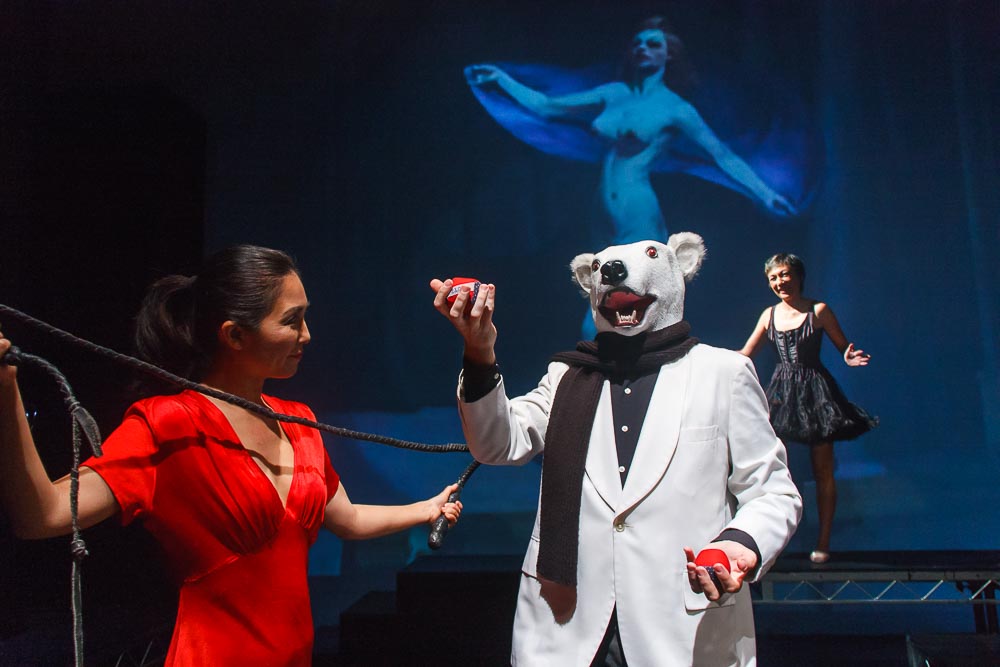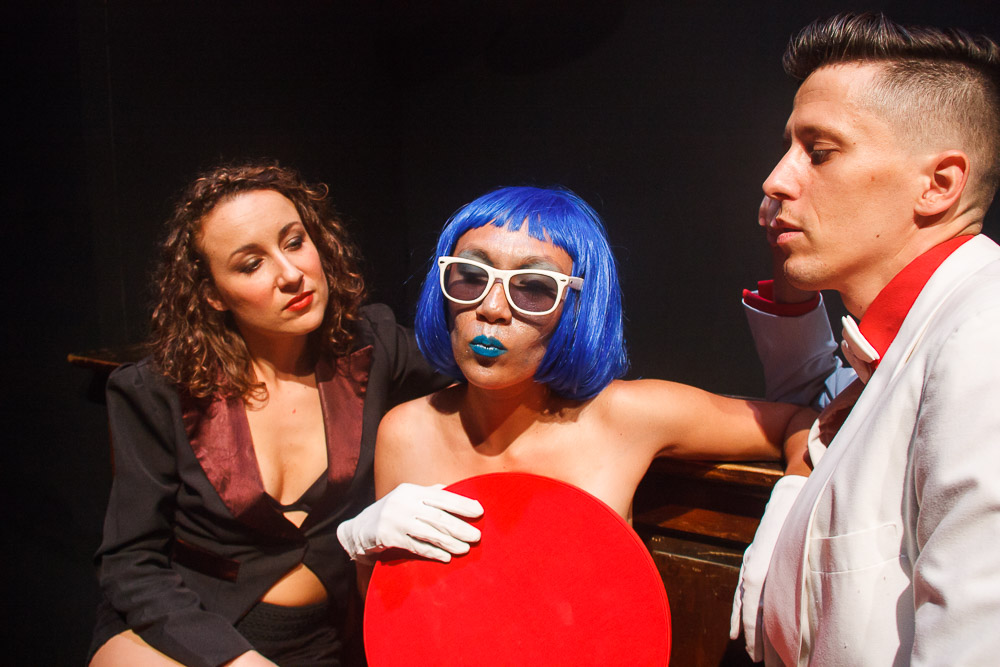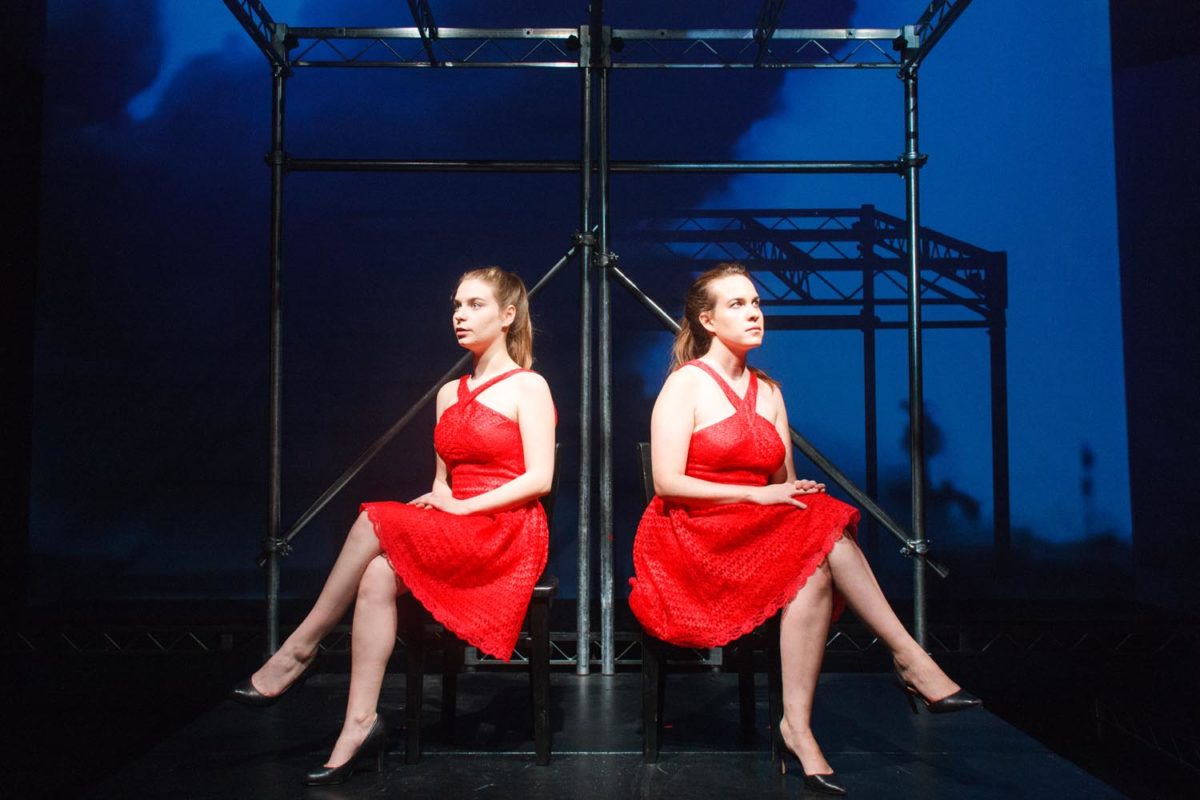Translated by Jennifer Wise
June 29 — August 12, 2018 at City Garage
The Great Depression in 1930s Chicago. Unemployment. Fear. Graft and corruption at City Hall. What do you need when society starts to fall apart? A strong man who steps in to take control. Arturo Ui, a small time gangster with an insatiable appetite for power, convinces a panicked population that no one has the answers but him. He and his cronies will provide the protection you’re looking for: even if you don’t know you’re looking for it. Brecht’s 1941 satirical masterpiece classic about Hitler’s rise to power in 1930s Germany demonstrates, with a savage blend of comedy and pastiche, how demagogues take power and how easily—and willingly—democracies become autocracies.
“City Garage.. is the ideal local company to revive this infrequently done, disturbingly timely play.”
‘The Resistible Rise of Arturo Ui’ at City Garage
The essentials: Bertolt Brecht’s 1941 satire, which he wrote while in exile from Germany and waiting for an American visa, has been described as “the American gangster movie meets Richard III.” The play’s account of a buffoonish, small-time Chicago racketeer who takes over the city’s cauliflower market is a thinly veiled and often savage parody of Hitler’s rise to power.
Why this? As Charles Isherwood wrote in Variety about a 2002 New York production, “ ‘Arturo Ui’ paints a blunt picture of a smug society easily corrupted and ultimately overtaken by a low-level hoodlum and his gang of thugs.” Does this sound at all familiar? Is it too soon? Or maybe too late? City Garage, known for daring, highly stylized sociopolitical theater, is the ideal local company to revive this infrequently done, disturbingly timely play.
— Margaret Grey, The Los Angeles Times
“Is there a through line from Capone’s Chicago and Hitler’s Germany to the current Washington interregnum? Director Frédérique Michel and producer Charles Duncombe make a good case in their City Garage production of Bertolt Brecht’s THE RESISTIBLE RISE OF ARTURO UI, featuring a very strong performance by Andrew Loviska in the title role.”
— Barlo Perry, ParisLA
“There are plays that are both timeless and timely and The Resistible Rise Of Arturo Ui is the best possible choice The City Garage could have made of the lot of them….City Garage makes good use of Wise’s rapid-fire and engaging translation with a cast that embodies all things 1930-40s Gangster with strong physical choices and a bevy of accents that are impressive and delightful.”
— The Theater Times
“Arturo Ui shows us precisely how yes It Can Happen Here. Worse (in some eyes) how it already has. More than once…
City Garage’s production captures many of the tricks and skillful theaticalities Brecht worked into his plays.” — David MacDowel Blue, Night Tinted Glasses.
Schedule:
| Runs: | Fridays, Saturdays 8:00pm; Sundays 3:00pm |
| Bergamot Summer Day on July 21st. Special 4:00pm show. Pay what you can at the door or regular prices at Brown Paper Tickets if you want to reserve ahead of time. Food trucks, music, and art events all day. | |
| Closes: | August 12, 2018 |
| Admission: | General Admission: $25; Students/Seniors $20 |
| Group Rate: | (Groups 10 and over) $15. |
For more information: Contact Charles Duncombe, Producing Director Charles@citygarage.org
“The School for Wives” by Molière
February 23 – April 1, 2018
(No show Saturday, March 10th)
Extended! Friday April 6th, Sunday April 8th, Friday April 13th, Saturday April 14th, and Sunday April 15th!
By Molière, translated by Frédérique Michel and Charles Duncombe.
In Molière’s comic masterpiece Arnolphe, a rich merchant, is under the delusion that he can create the perfect marriage for himself by creating the perfect wife. He raises a young orphan, Agnes, from infancy, determined to keep her ignorant of everything except what he teaches her. As the play begins, he is about to marry her at last, or so he thinks, until the young woman skillfully turns the tables on him. In this award-winning translation by Frédérique Michel and Charles Duncombe City Garage remounts its acclaimed 2009 production with a contemporary twist that speaks to the issues of patriarchy, gender, and power in the “Time’s Up” headlines of today.
“Delightful…almost dance-like…the humor is nonstop…Roberts’s performance touches our hearts.”
— David MacDowell Blue, Night Tinted Glasses
TOP TEN – Recommended!
“Director Frederique Michel relies on an elegant new translation she’s written in collaboration with producer and designer Charles Duncombe, with a staging that emphasizes the artificiality of Moliere’s comedy with balletic, stylized movement. The result is crowd-pleasing and consistently funny. As Arnolphe, Roberts captures the quintessence of male arrogance, egotism and insensitivity, which makes his growing desperation hilarious and leaves us longing to see him get his comeuppance. Pida brings the asset of real youth (she’s a high school senior) to the ingénue role of Agnes….Jaime Arze and David E. Frank score as a pair of dimwitted servants, and Troy Dunn is smoothly insinuating as Arnolphe’s friend, Chrysalde. The handsome set departs from the play’s 17th century time period; Duncombe chooses instead to set the action in “a time when such things happen,” using a modernistic flavor. Josephine Poinset provides the clever and stylish costumes.”
— Stage Raw
WEEKEND PICK! – LA TIMES
“This comedy, considered by many to be Moliere’s greatest, concerns a controlling guardian who has carefully cloistered his decades-younger ward in the hope of transforming her into the “perfect” (and perfectly ignorant) wife who will never stray. Controversial in its day, the premise seems abhorrently timely now. Dedicated avant-gardists Frédérique Michel and Charles Duncombe have devoted their theatrical careers to defiantly alternative theater. Their well-regarded translation of “Wives,” first produced at their theater in 2009, brings an invigoratingly revisionist perspective to Moliére’s classic.”
— Los Angeles Times
“The central character in Molière’s comedy, newly translated by Frederique Michel and Charles Duncombe, could be and often is a punching bag. But not here…. The play emerges less as a clown show and more as a wistful, almost elegiac rumination on aging and folly.”
“Go!” — LA Weekly
“This new translation/adaptation of Moliere by director Frederique Michel and Charles A. Duncombe is clever, colloquial, and far more actable than most recent versions.”
— Backstage
Buy the Book!
This best-selling translation is available from Amazon.

Moliere’s The School for Wives: A New version in English by Charles A. Duncombe and Frederique Michel **CITY GARAGE BEST SELLER** This translation is being used in university courses.
Purchase the book from Amazon
This project is supported, in part, by the Los Angeles County Supervisors through the Los Angeles County Arts Commission and the Santa Monica Arts Commission.
This project is supported, in part, by the Los Angeles County Supervisors through the Los Angeles County Arts Commission and the Santa Monica Arts Commission.


“Wake” by Gordon Dahlquist
November 10 – December 17, 2017
World premiere by the author of the international bestseller “The Glass Books of the Dream Eaters.”
Irene awakes from a cryogenic chamber into a future where her terminal cancer has been cured but the world as she knew it no longer exists. She is welcomed by curious humans who command and are commanded by “Platform,” a vast computer network which appears to have replaced all known reality. Has the Singularity occurred? Is there still a recognizable planet where earth once was? In Wake Dahlquist examines society and sociability when lives are long, wants are met, and no need for cooperation beyond the response to solitude.

Reality Bites — If You Can Even Call It Reality — In This Post-Apocalyptic Sci-Fi Satire
Bill Raden | November 20, 2017 | 8:05am
Accorrding to the dictionary, “wake” can mean different things: It can be the vigil held over a corpse on the eve of burial; it can describe the waves trailing a passing ship or left by an extinct civilization; or it can signify the state of being aroused or made aware. According to Wake, Gordon Dahlquist’s rousing sci-fi satire about the ultimate fate of humankind, currently getting a sleek world premiere at City Garage, it also can mordantly embrace all of the above.
The time-leaping tale begins with a venerable science fiction premise: Heroine Irene Suarez (Natasha St. Clair-Johnson), a New York immunologist racked with metastasized pancreatic cancer in 2017, is placed in a cryogenic capsule in Mamaroneck, New York, to be thawed and resuscitated in a hermetic and inconceivably remote future.
In production designer Charles Duncombe’s minimalist arrangement of tiers and ramps, that future is represented as a blandly featureless room without windows or doors. It’s where Irene is greeted by May (Alicia Rose Ivanhoe), a friendly and curious if somewhat linguistically maladroit denizen whose silvery Lycra bodysuit (courtesy of costumer Josephine Poinsot), together with the ever-present visage of an identically coiffed and clothed figure (Megan Kim) projected on the upstage wall, are the first hints that something Orwellian and technologically dystopian might have transpired during Irene’s eons of sleep.
Much of the fun comes from Irene’s attempt to reconstruct the lost years. While May proves maddeningly vague at filling in the whens, wheres and hows, the fragmented hints at the planet’s fate that begin to emerge only increase Irene’s disquiet over her dire predicament. It seems that the Holocene is part of a distant and dimly understood past, whose end came via some sort of climate change–triggered environmental cataclysm. In the desperate hope that one day the species could be reconstituted from its archived DNA, a survivor population designed a global computerized omniscience called the Platform. Embodied by City Garage regular Kim as an affable and accommodating “construct” of the same name, the Platform now regulates the “sentient environment” as well as the society by which Irene finds herself welcomed as a sort of living natural history museum exhibit.
By eliminating the human middleman, society is finally one with the spectacle.
If that all sounds vaguely Matrix-like, the similarity is strictly ironic. Wake trades in — and frustrates — a raft of familiar sci-fi clichés and genre expectations in a wry pastiche that sets the stage for what Polish sci-fi master Stanislaw Lem once called “the drama of cognizance.” By dropping Irene into the Platform, where she is stripped of the taken-for-granted assumptions that ground identity and differentiate the real from the merely represented, Dahlquist lampoons the collective solipsism of all institutionalized systems of belief while underscoring the philosophical problem of agreement on any kind of shared reality.
Irene does not connect with other remnants of humanity in order, say, to organize a revolt and take back the planet from authoritarian oppressors, a trope dating back to H.G. Wells’ The Sleeper Awakes (1910), the grandaddy of Matrix-like political fantasies. Instead Dahlquist closes off that possibility by eliminating not only the distinction between the real and the virtual but also the urgent need to distinguish it. The Platform proves the most hospitable and accommodating of hosts. Far from a prison, its environment is a constantly morphing place of endless choice and instantaneous gratification — a kind of otherworldly shopping mall from which everything unpleasant has been expelled except for loneliness. Its virtually generated inhabitants, like May and her daft friend Sen (Jeffrey Gardner), are left to contentedly while away their existence with trivial preoccupations around satisfying their every whim and appetite. By eliminating the human middleman, society is finally one with the spectacle.
The only exception proves to be Sarah (Sandy Mansson), another cryogenic survivor from Earth’s 21st-century past — or, more accurately, the Platform-generated memory of what 40 years ago had been Sarah. A middle-aged horse breeder from Pennsylvania, Sarah tells Irene about the 60 additional years she lived among the Platform before boredom finally drove her from its protected, Platonic environs and into the nonexistence of the outside world. What happened then, or what kind of creatures might live there, the Platform cannot say, although Duncombe’s evocative projections of pristine, primordial landscapes slyly suggest an Earth that has returned to the fecund grandeur of a pre-human natural state.
Director Frédérique Michel’s tightly composed staging cannily extends the script’s mechanistic absurdities, both through wittily synchronized movement between Kim and the constructs and with touches like returning “offstage” characters to visible seats in the wings, where they await their next scenes like powered-down cyborgs set to sleep mode. Ivanhoe and Gardner are delightfully deranged as bubbly, wide-eyed human simulacra, but Ivanhoe is especially funny massacring Dahlquist’s fractured, almost aphasic diction. For her part, St. Clair-Johnson nimbly anchors the comedy as an exasperated, disoriented and finally resigned “straight man,” while Mansson contributes poignant notes of human warmth.
Although the ensemble is clearly still fine-tuning its timing, and Wake is consequently guilty of what sometimes feel like overly austere intellectual stretches, the evening’s momentum rarely flags. More importantly, at a moment when headlines seem to trumpet the potential calamities of debasing public policy with alternative facts, the play comes as a timely reminder that the confrontation with the other is ultimately always a confrontation with the self.
City Garage at Bergamot Station Arts Center, 2525 Michigan Ave., Bldg. T1, Santa Monica. (310) 453-9939, citygarage.org.
Bill Raden is an award-winning reporter and theater critic who reviewed his first play for L.A. Weekly on a typewriter. He still keeps his manual Olivetti inked and oiled, just in case.
Wake Review from Night-Tinted Glasses
Spoilers ahoy!
Audience expectations tend to be tricky things. To some degree this depends upon genre.
Wake by Gordon Dahlquist, if not science fiction, certainly begins and explores a pretty clear and well precedented science fiction trope. Someone wakes from cryogenic sleep far into the future and must adjust. Buck Rogers essentially.
Except, no.
Irene (Natasha St. Clair-Johnson) had advanced pancreatic cancer and used her resources on a wild chance, that someone frozen in liquid nitrogen just might be revived in later centuries. When she wakes in a strange room to the greetings of May (Alicia Rose Ivanhoe), a cheerful young woman with a strange vocabulary, the truth dawns on her pretty quickly. It worked. Behold the future!
Yay?
At this point many a science fiction tale would begin describing the future world, if in fact the story turns out to be some kind of social commentary on the trends of human society. Or it may become some kind of adventure in which the awakened person will prove crucial to history or some such (this was the story of the second JJ Abrams Star Trek movie). I never thought the latter very likely here, but wondered how the first part of that expectation might play out. That at first May seems reluctant to tell Irene much heightened that expectation. At first. But increasingly, as we get to know more about this future, the less terribly important that became. Details all proved important, but not what the story was about.
Irene began and remained the story’s focus, for every moment, and she remained the only character on stage the entire play. All seventy minutes with no intermission. Even as we meet the sentient computer (or something like that) called The Platform (Megan Kim) that both runs and enables, nurtures and learns from the lives of those like May and her would be boyfriend Sen (Jeffrey Gardner), the more we share Irene’s curiosity and frustration. When is this? How much time has passed? Hints given early prove disturbing. Her capsule? Found in sea water. People have very odd beliefs about her own time, not least the amount of violence. No one, not even The Platform, knows what she’s talking about when Irene mentions ancient Egypt or the Pyramids.
Her world is gone. Her context has vanished, evaporated over time. Hardly anyone else was ever found frozen and with enough left to be revived. That was Sarah (Sandy Mansson) who died decades ago.
With us, Irene endures this loss — the realization of being utterly alone, not physically nor literally, but robbed of every single detail that made life make sense. Not by anyone, just by chance. This then proves the exploration, the odyssey of this work — not a revelation of plot or world-building, but of human courage in the face of tremendous loss. All in all, Wake does an astounding almost Haiku-esque job of giving us the heart, the soul of the story and very nearly nothing else.
We see someone find courage to go on. To trust the supremely unfamiliar. To begin to let go of what after all can never come again — the past.
Wake runs Fridays and Saturdays at 8pm, Sundays at 3pm (pay-what-you-can at the door only) until Sunday, December 17, 2017 at the City Garage, Building T1, Bergamont Station, 2525 Michigan Avenue, Santa Monica CA 90404.
“Carmen Disruption” by Simon Stephens
September 8 – October 15, 2017
I’ll gather my breath. I’ll walk out of my room. I’ll know exactly where I’m going to go. The voice in my head tells me exactly where to go.
An opera singer lost in the city. A gorgeous male prostitute. A tough-talking taxi driver. A global trader. A teenage dreamer. Everyone’s looking for something they can’t find in this US premiere from acclaimed British playwright Simon Stephens (Heisenberg; The Curious Incident of the Dog in the Night-Time) whose strange and beautiful play re-imagines Bizet’s opera Carmen and explores the possibility of love in a fractured urban world.
“The Singer,” a mezzo-soprano who criss-crosses Europe playing the title role in ‘Carmen’ has arrived in an unidentified city to do so again, but a random incident causes her already nebulous sense of self to start unravelling. Carmen, here a busy “rent boy,” has a disastrous encounter with a client that shakes his sense of self. Don Jose is a taxi-driving mother pining for her son. Meanwhile, a suicidal young girl, dumped by her boyfriend, is the bereft Micaela, and a corrupt futures trader assumes the role of Escamillo.
These are lonely souls, yearning for love, home, a sense of self and real connection in an age of superficial digital communication and narcissistic, illusory identities. Simons uses broken shards of Bizet’s opera to fashion a mosaic of monologues about our infatuation with technology and digital communication, less a recreation of the opera than a deconstruction of it, reflecting on the strangeness of a professional singer’s life and the aching disconnection at the center of our atomized contemporary world.
“Shattering and reimagining our notions of theatre… Carmen Disruption reminds us how thrilling it can be to see a fresh take on a familiar tale…” -The Guardian (London)
This project is supported, in part, by the Los Angeles County Supervisors through the Los Angeles County Arts Commission and the Santa Monica Arts Commission.



“≈ [Almost Equal To]” by Jonas Hassen Khemiri
How much do you earn? Who do you serve? The new world economics is built on inequality that threatens us all.
This remarkable new work from one of Sweden’s most celebrated novelists and playwrights takes on this issue in highly personal terms: a young man from an immigrant background trying to find his first job; a professor of economics desperately trying to hold onto the one he has; his wife, who nurses fantasies of an ecologically responsible life in the country; a homeless hustler who might be more than he seems; and a young woman who, in the cut-throat world of her office, may or may not be responsible for the death of a rival co-worker. Think economics is strictly for academics?
This play, with its unforgettable moments of funny and brutal honesty about the human cost of a rigged system, will make you think again.
Third Sunday Q&A:
After the 3:00pm performance on Sunday, June 11, please join us for an informal discussion with the cast and crew.
This project is supported, in part, by the Los Angeles County Supervisors through the Los Angeles County Arts Commission and the Santa Monica Arts Commission.



“Adam & Evie” by Charles L. Mee
March 24 – April 30, 2017
Much of our life is spent coupling, uncoupling, or recoupling. We’re obsessed by love and sex: how to get it, how to keep it, or how to get out of it and try again. In this new work, multiple-award-winning visionary playwright and poet Charles L. Mee looks at love from Adam and Eve to our own rapidly changing times where the possibilities of thwarting yourself in love expand with every new boundary we cross.
Third Sunday Q&A:
After the 3:00pm performance on Sunday, April 9, please join us for an informal discussion with the cast and crew.
This project is supported, in part, by the Los Angeles County Supervisors through the Los Angeles County Arts Commission and the Santa Monica Arts Commission.



“Grimly Handsome” by Julia Jarcho
A pair of Christmas tree salesmen secretly wreak havoc in NYC. A pair of detectives are bent on catching a serial killer. A young woman finds herself drawn into a cat-and-mouse game and transformed in ways she could never have imagined. Well, maybe she could’ve. Meanwhile, wild animals have been sighted in the vacant lot across the street. Are they dogs? Raccoons? Or something more ferocious?
This project is supported, in part, by the Los Angeles County Supervisors through the Los Angeles County Arts Commission and the Santa Monica Arts Commission.



“Phoebe Zeitgeist Returns to Earth” by Charles A. Duncombe
September 30—November 13, 2016
A new play inspired by Rainer Werner Fassbinder’s Blood on the Cat’s Neck
Nudity.
Fourth Weekend Q&A October 23:
After the 3:00pm performance on Sunday, October 23rd, please join us for an informal discussion with the cast and crew. Don’t miss it!
This project is supported, in part, by the Los Angeles County Supervisors through the Los Angeles County Arts Commission and the Santa Monica Arts Commission.



“right left with heels” by Sebastian Majewski
“Director/choreographer Michel and designer Charles A. Duncombe have created a marvelous evening of theater.”
July 8—August 14, 2016
right left with heels recounts the story of the Holocaust and post-war Poland from the ironic perspective of a pair of high heel shoes that once belonged to Magda Goebbels, wife of Nazi Germany’s Minister of Propaganda. The shoes, who may have inherited her racist point of view, tell their own story: from their manufacture in Auschwitz to their tragic end on the feet of a transvestite murdered by contemporary Polish “patriots.” Magda Goebbel’s wandering shoes provide a poignant and provocative insight into individual guilt and wickedness, and addresses accountability in the face of history from the end of WW II to today’s frightening rise of the new right.
Fourth Weekend Q&A July 31:
There will be a discussion with the cast and creative staff Sunday, July 31 after the 3:00pm performance. Don’t miss it!
LA WEEKLY: GO! (click here to read full review)
Staged by Frédérique Michel with her customary bold and bawdy panache, the production features two female performers, Lindsay Plake and Alexa Yeames, who, dressed in teasing red and black costumes by Josephine Poinsot, cavort provocatively about the stage while saucily recounting a history of loss, pain and terror.
STAGE RAW Recommended/Our Top Ten! (click here to read full review)
…Director/choreographer Michel and designer Charles A. Duncombe have created a marvelous evening of theater. Their style is a distinctive, individual form of dance-theater, using a movement vocabulary that, in the present case, communicates immediately with gestures sometimes like seductive cabaret performance, always with a sense of the pair operating like a single organism — or like female acolytes in a wicked ritual. Those familiar with past productions will recognize common elements of design (hues of red and black in the costumes, vivid graphics as a backdrop) —the elaboration of a singular theater-language…
This project is supported, in part, by the Los Angeles County Supervisors through the Los Angeles County Arts Commission and the Santa Monica Arts Commission.



“Othello/Desdemona” by Charles A. Duncombe
April 15—May 29, 2016
Othello, in the midst of an identity crisis, examines and rejects his status as a servant of the Venetian State. Hungry for political power, he experiments with the idea of self-identifying as white. Desdemona, a Lolita trapped in a caged bed, is a spoiled brat with a mind of her own and a hunger for fame. She’s still deeply in lust for the lover she’s lost, while he struggles with racism and white privilege. Egged on by Iago, hovering like a punk-rock bird of prey, and a sassy, transgender Emilia, this is a love story that, just as in Shakespeare, is going to end badly.
Nudity.
LA TIMES REVIEW:
Playwright, producer and production designer Charles A. Duncombe doesn’t so much deconstruct the tragedy of a noble Moor undone by manipulated jealousy as turn its interior workings into an irreverent dissertation on the post-millennial landscape… With director Frédérique Michel and her valiant cast maintaining a jagged emotional pull beneath the High Performance austerity, “Othello/Desdemona” isn’t exactly shy about upending expectations… It’s a starkly elegant, international-festival-ready staging, with costumer Josephine Poinsot assisting Duncombe’s trademark red-black-and-white scheme. Throughout, typical City Garage audacity is detectable… “Othello/Desdemona” is undeniably unlike anything else in town.
Read the full LA Times review here!
STAGE RAW REVIEW:
“Somewhat reminiscent of Stoppard’s Rosencrantz and Guildenstern Are Dead… Director Frederique Michel’s artful staging cleverly takes the familiar characters and pushes them in unusual directions… The production is full of interesting images and psychological underpinnings… [and] possesses a playfulness that’s undeniably appealing… Michel’s trenchant sense of irony — and the intelligence of the underlying thoughts in the piece – keep us intrigued.”
Read the full Stage Raw review here!
Available now on Amazon or at the theater!
This project is supported, in part, by the Los Angeles County Supervisors through the Los Angeles County Arts Commission and the Santa Monica Arts Commission.




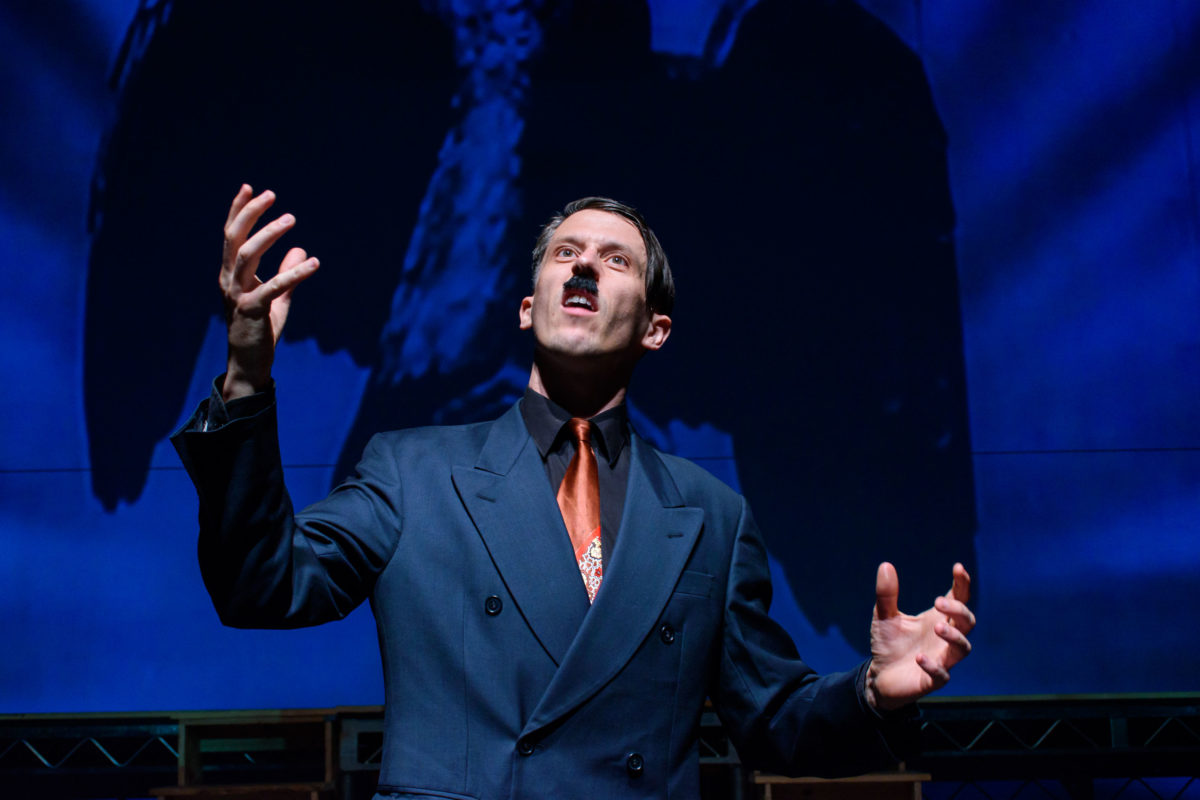











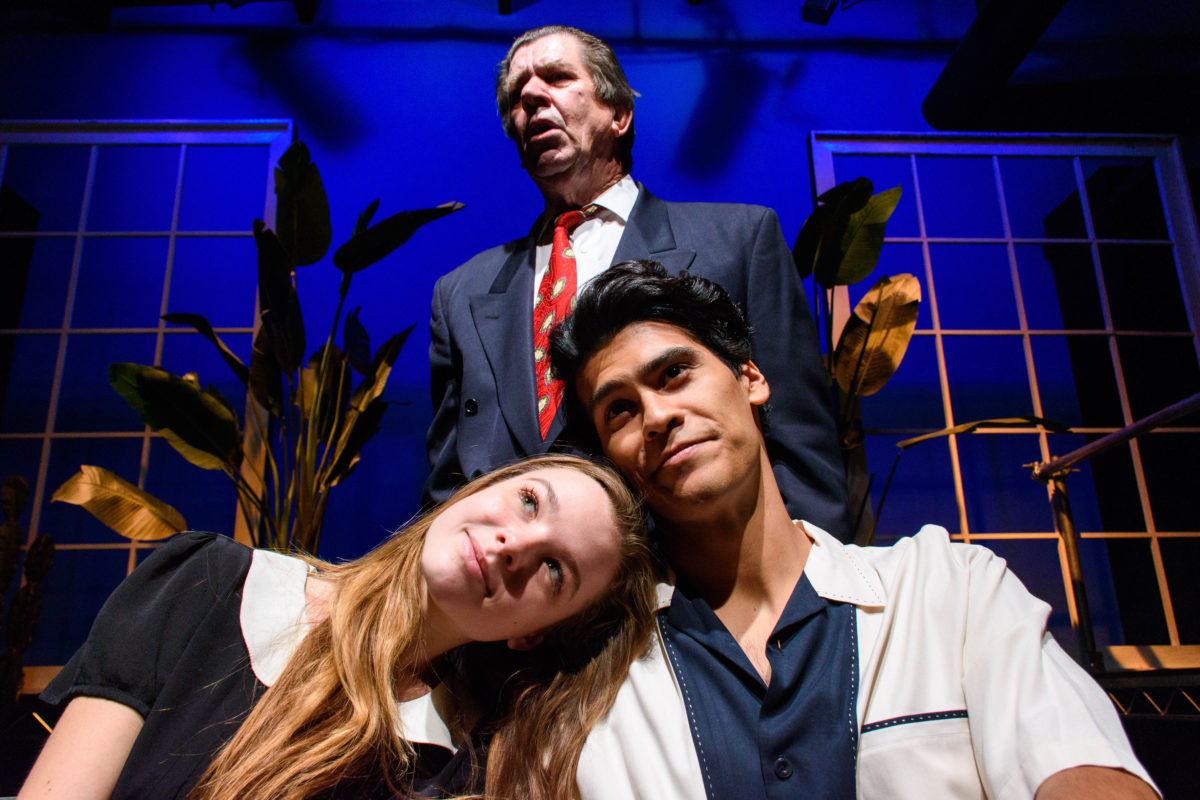











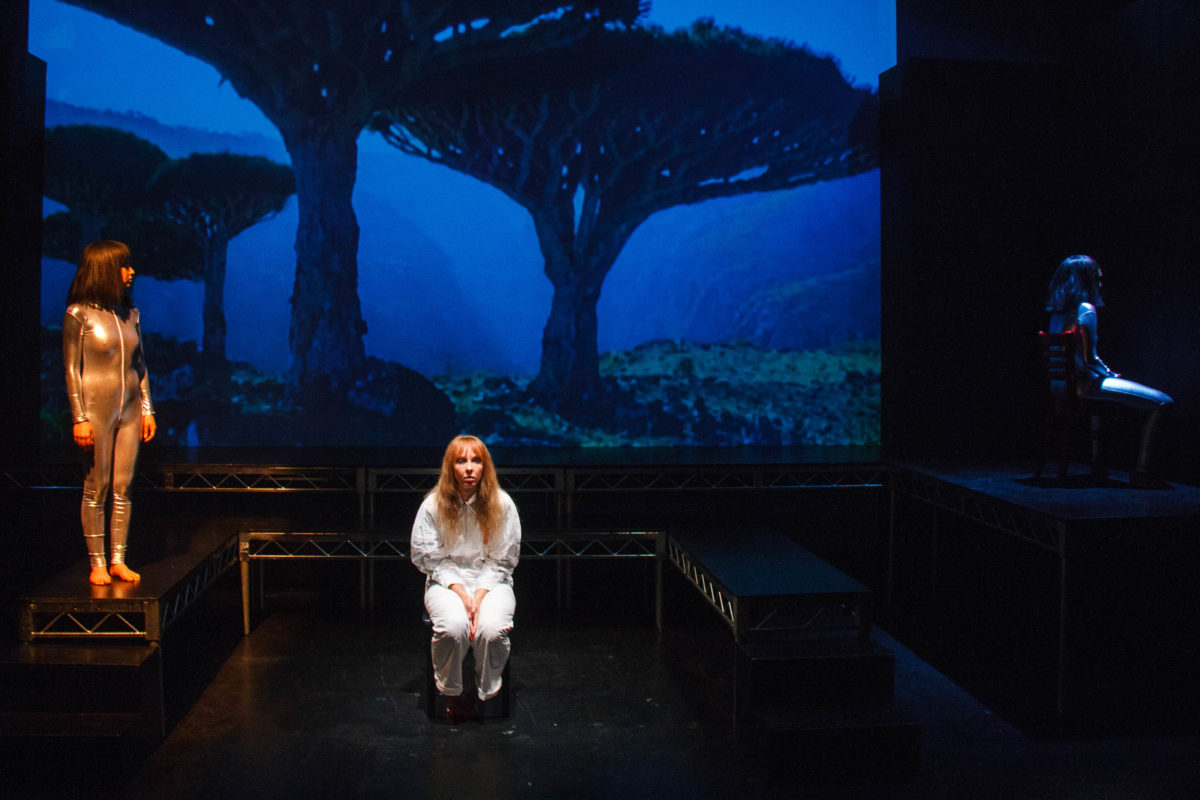










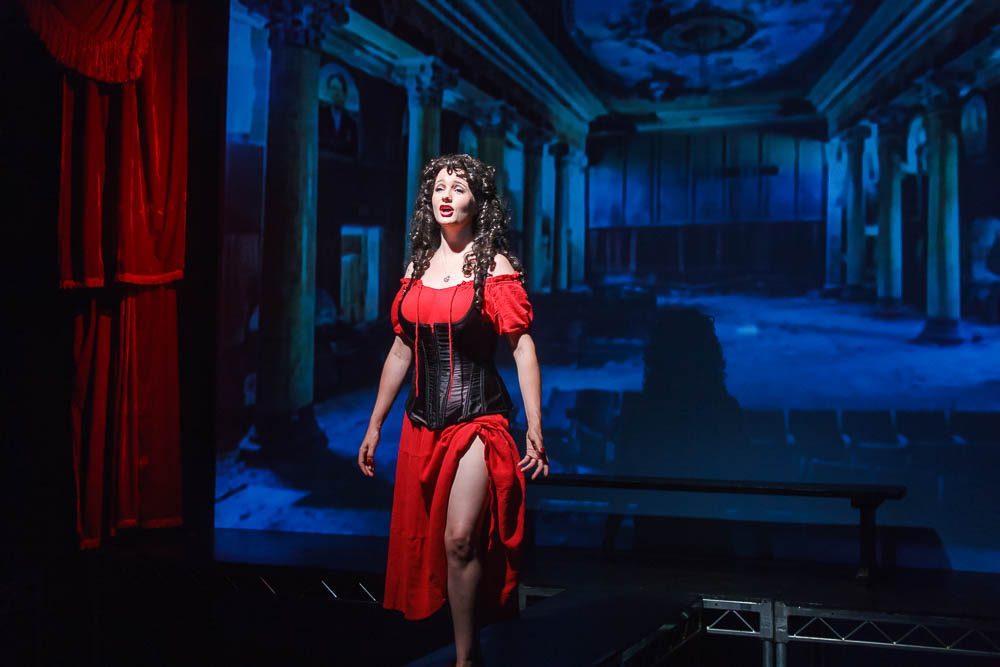











![“≈ [Almost Equal To]” by Jonas Hassen Khemiri](https://citygarage.org/wp-content/uploads/2017/09/Almost-Equal-To-2831.jpg)







